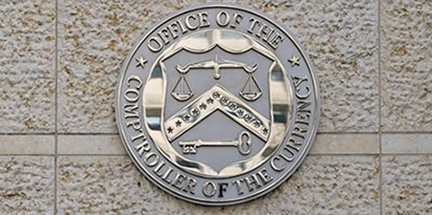OCC Allows U.S. Banks to Hold Crypto for Blockchain Network Fees in New Regulatory Guidance

The U.S. Office of the Comptroller of the Currency (OCC) has issued new guidance confirming that national banks may hold certain cryptocurrencies strictly to cover blockchain transaction fees. The update, released in Interpretive Letter 1186 on November 18, 2025, marks a notable shift that gives banks more operational freedom when interacting with blockchain networks.
Banks Can Now Hold ETH to Pay Gas Fees
The OCC clarified that banks can keep small amounts of native crypto assets—such as Ethereum’s ETH—on their balance sheets when needed to pay network fees. These fees (commonly known as gas fees) are required to execute transactions and validate activity on blockchains like Ethereum.
Without holding these tokens, banks risked delays, service disruptions, or reliance on third-party intermediaries. The new guidance allows institutions to handle these payments directly, improving speed and reducing operational costs.
Regulated Crypto Holdings Tied to Operational Needs
The OCC emphasized that any crypto held must be directly linked to permissible banking activities, not speculative trading.
Banks may only maintain the amount of native tokens necessary to support upcoming transactions, and those holdings must remain small relative to the bank’s capital.
Strict risk management requirements still apply, including controls for market volatility, transaction congestion, and custodial risk.
A Practical Step Forward for U.S. Banks Using Blockchain
Previously, banks offering crypto custody or blockchain-related services had to rely on external providers to pay gas fees. Now, institutions can streamline operations by keeping the tokens required to process customer transactions.
For example:
If a bank needs to move a client’s assets across the Ethereum network, it can now hold enough ETH to pay the required gas fee itself—speeding up settlement and reducing friction.
Potential Pathway to Broader Blockchain Participation
Industry observers note that this seemingly small rule change could pave the way for banks to become more active participants in blockchain ecosystems.
If banks are already paying gas fees directly, they may eventually explore running validator nodes, utilizing on-chain infrastructure, or offering more advanced crypto services.
What Comes Next?
Key questions remain as banks evaluate the new guidance:
- Will major institutions begin holding ETH and other native tokens in practice?
- How will regulators assess compliance and risk controls?
- Could this lead to wider adoption of crypto-based payment mechanisms across traditional finance?
While the update is not a green light for banks to speculate in crypto, it offers greater flexibility and acknowledges the growing need for blockchain-native tools within regulated financial services.
The move signals that U.S. banking regulators are gradually making space for practical, operational crypto usage, even as broader regulatory issues continue to evolve.




